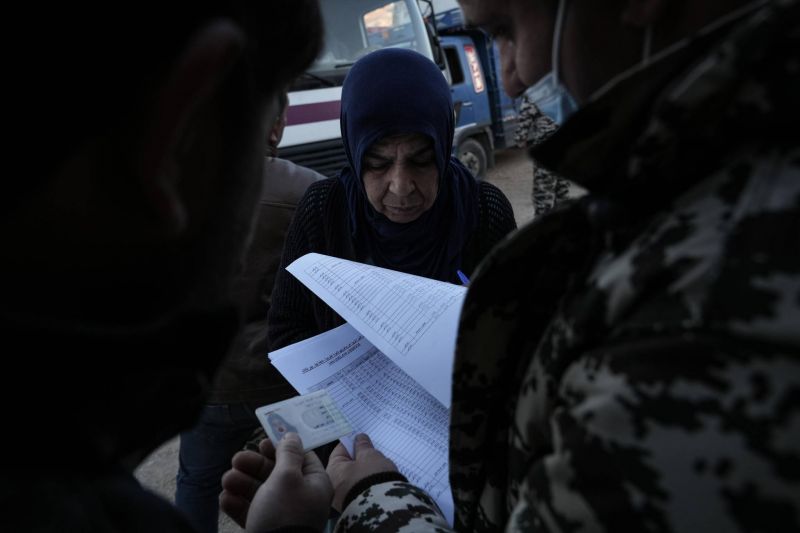
A member of General Security inspects a Syrian woman's papers during a return convoy on May 14, 2024. (Credit: Mohammad Yassine/L'Orient-Le Jour)
The issue of Syrian migrants and refugees continues to cause a stir. Over the weekend, an outcry arose when Ivo Freijsen, head of the office of the United Nations High Commissioner for Refugees (UNHCR) in Lebanon, sent a letter to the caretaker interior minister, Bassam Mawlawi. In his letter, the UN diplomat expressed his opposition to a series of “inhumane measures” taken by the authorities to crack down on Syrians living illegally in Lebanon. The UNHCR also objected to the role played by municipalities in implementing decisions by the Ministry of the Interior to check the papers of Syrians living in homes located in territories under the jurisdiction of each municipality and to close down shops and businesses run by Syrian refugees in an irregular situation.
In an increasingly passionate and sometimes xenophobic climate, this letter defending Syrians in Lebanon was bound to provoke strong reactions. Starting with the leader of the Lebanese Forces, Samir Geagea, who on Sunday lashed out at Freijsen.
The LF leader asked Mawlawi to take all necessary legal action against the head of the UNHCR office in Lebanon. Geagea accused the UN official of violating Lebanese sovereignty and interfering in the implementation of the country's laws, by attempting to obstruct measures taken by the authorities. “It is deeply regrettable to see the extent to which Lebanese legitimacy has been compromised, to the extent that the head of the UNHCR office in Lebanon has taken the liberty of sending a letter to the Minister of the Interior ... calling for a halt to what he describes as inhumane practices, and for a reversal of the measures taken against Syrian refugees in an irregular situation,” said Geagea. “It's as if he himself had become the host and we were his guests,” he quipped.
The 2003 memorandum
“We will not accept the actions of the head of the UNHCR. This land is ours, this country is ours, and sovereignty belongs to the Lebanese people and state,” he continued, adding that Freijsen could not “justify his actions by humanitarian considerations” because “no people in the world have shown more empathy towards refugees than the Lebanese.” Nor, in his view, could the UN official invoke international law to justify his initiative “because the memorandum of understanding signed between Lebanon and the UN in 2003 is clear and unambiguous.” That year, the UNHCR and the Lebanese government signed a memorandum of understanding stipulating that refugees and asylum seekers would be tolerated, but only for a limited period, pending resettlement or voluntary repatriation.
“If the head of the UNHCR is truly concerned about the conditions of illegal refugees in Lebanon, he should organize their transfer to his own country and deploy his humanitarian efforts there for the next thirteen years, just as the Lebanese have done for the previous thirteen years,” added the LF leader.
“I demand unequivocally that the Minister of the Interior take all possible legal measures against the head of the UNHCR office in Lebanon,” insisted Geagea. “He has exceeded his legal limits in all areas, whether by distributing refugee cards to Syrians in Lebanon, in violation of the 2003 memorandum, by treating illegal migrants as refugees and distributing aid to them, or by ignoring the one-year limit stipulated in the memorandum, which requires them to leave rather than remain in the country,” he added. He also asked Mawlawi to “take all necessary legal measures against the head of the UNHCR, for violating Lebanese sovereignty and interfering in the application of laws on national soil, by attempting to obstruct measures implemented by official bodies.”
Putting pressure on Bashar al-Assad
Lebanese Forces MP George Okais stressed “the importance of taking a firm stance on the Syrian presence in Lebanon and approaching it from the angle of national sovereignty, where we fear no one and do not succumb to threats from any party.” Speaking on radio station Voice of Lebanon, Okais affirmed: “The expulsion decision cannot be contested by the West, which does not interfere in Lebanese internal affairs.” Addressing the Europeans, he continued: “Help us put pressure on Syrian President Bashar al-Assad to organize the return of his people to safe areas in Syria.”
The Syrian refugee issue regained prominence in Lebanese domestic politics after the European Union announced a €1 billion aid package for Lebanon in early May, to combat illegal immigration to Europe. Some have described this aid as a “bribe” to keep Syrian refugees in Lebanon.
The EU's announcement was made against a backdrop of renewed hostility to Syrian migrants and refugees in Lebanon, following the assassination in April of Pascal Sleiman, a political leader of the Lebanese Liberation Front, by a gang of Syrian nationals. Since then, the Lebanese authorities have launched a series of measures to restrict the presence of Syrians in the country and to open up the possibility of deporting illegal migrants.
Outgoing Prime Minister Najib Mikati decided not to attend the conference on refugees in Brussels on May 27. The Lebanese Parliament, meanwhile, addressed the issue in a general debate during the week, without coming up with anything substantial.
Since the start of the Syrian civil war in 2011, Lebanon has taken in around 1.5 million Syrians, the highest number of refugees per capita in the world. Some 839,000 of them are registered with the United Nations High Commissioner for Refugees (UNHCR) but the exact number of Syrians in Lebanon is unknown as the Lebanese government asked the UNHCR to stop registering them in 2015.
This article originally appeared in French in L'Orient-Le Jour.